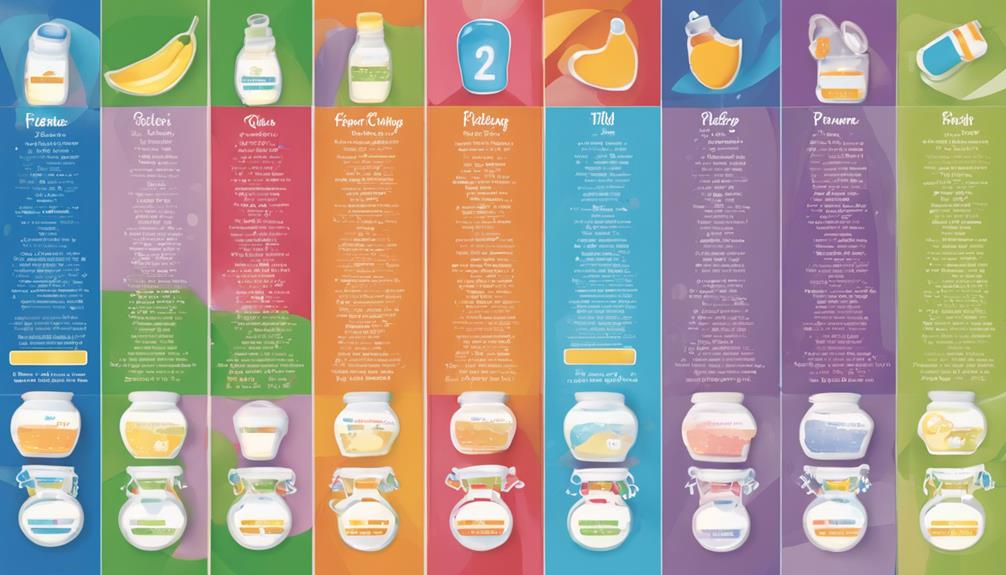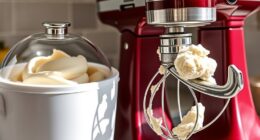As parents, we have all experienced those moments when our child suddenly needs a diaper change right after being fed formula. It can result in quite a messy situation. But what if this becomes a frequent occurrence, causing you to wonder if it’s normal or if there may be an underlying problem at play?
Understanding why your baby poops after every formula feeding can provide valuable insights into their digestive health and overall well-being. Let's explore some possible causes and practical tips for managing this situation effectively.
Key Takeaways
- Regular pooping after formula feeding is normal for healthy babies.
- Monitor bowel movement frequency and consistency for digestive health.
- Adjust feeding practices to optimize digestion and prevent overloading.
- Consider the type of formula used and seek pediatrician advice if needed.
Possible Causes of Frequent Pooping
Frequent pooping after every formula feeding can be attributed to various factors that influence a baby's digestive system. For a baby being formula-fed, it's not uncommon to experience more regular bowel movements compared to breastfed babies. The type of formula being used can also play a role in the frequency of stools. Formula-fed infants may have a faster digestive response to the formula, leading to more frequent pooping episodes. It's important for parents to remember that if their baby appears healthy and isn't displaying signs of discomfort, frequent pooping after formula feeding is generally considered normal and not a cause for concern.
Understanding the reasons behind your baby's bowel movements can provide reassurance and help alleviate any worries you may have. While changes in stool frequency can be noticeable, especially after formula feeding, keeping an eye on your baby's overall well-being is key. Remember, every baby is unique, and their digestive patterns can vary. If you ever feel concerned about your baby's pooping habits, don't hesitate to reach out to your healthcare provider for guidance and support.
Tips for Managing Pooping Frequency
When managing your baby's pooping frequency after formula feedings, it's important to maintain a balanced approach that considers both their digestive needs and overall well-being. Babies who poop after each formula feeding are often just exhibiting a normal response to the composition of formula milk. This regularity can actually indicate good digestion and absorption of essential nutrients. Monitoring your baby's bowel movements is key to tracking their digestive health. Keep an eye on the frequency and consistency of their poops to make sure everything is on track.
However, sudden changes in pooping frequency or the presence of other concerning symptoms shouldn't be ignored. If you notice anything unusual or have any worries, it's best to consult a pediatrician for guidance. They can provide tailored advice and address any underlying issues that may be affecting your baby's digestion. Remember, your pediatrician is there to support you and your baby's well-being every step of the way.
Adjusting Feeding Schedules
To address the frequent pooping issue after formula feedings, adjusting the feeding schedules can play an important role in managing your baby's digestive process more effectively. It's crucial to space out formula feedings to give your baby's digestive system ample time to process each feeding properly. Consider offering smaller, more frequent feedings to prevent overloading their system, which could lead to immediate bowel movements after each feeding.
Watch out for gulping formula too quickly, as this rapid intake of food can trigger instant bowel movements. Experiment with different feeding positions and bottle nipples to optimize your baby's feeding technique and potentially reduce the frequency of post-feeding bowel movements.
If adjusting feeding schedules and techniques doesn't alleviate the issue, it's advisable to consult with a pediatrician. They can help rule out any underlying digestive issues or intolerances that may be causing your baby to poop after every formula feeding. Your pediatrician can provide personalized guidance and support to make sure your baby's digestive health is properly addressed.
Choosing the Right Formula

When selecting the appropriate formula for your baby, it's essential to take into account factors such as potential allergies and the gentle ingredients present in the formula. Here are some tips to guide you in choosing the right formula for your little one:
- Consider opting for a hypoallergenic formula: If your baby is experiencing frequent bowel movements after feedings, it could be a sign of allergies. Choosing a hypoallergenic formula can help rule out potential allergens and provide relief for your baby's digestive system.
- Look for gentle ingredients: Opt for formulas with gentle ingredients to reduce the likelihood of digestive issues and regulate your baby's bowel movements. Ingredients labeled as 'easy to digest' or 'gentle on the stomach' can be beneficial for babies with sensitive stomachs.
- Consult with your pediatrician: Discuss the possibility of trying a different formula with your pediatrician to see if it helps alleviate the frequent pooping pattern. Your pediatrician can provide valuable insights and recommendations based on your baby's specific needs.
Addressing Pooping Concerns
Addressing pooping concerns in formula-fed babies is an important aspect of monitoring their digestive health and overall well-being. It's typical for a formula-fed baby to poop after each feeding, reflecting the composition of formula that aids in digestion. Unlike breastfed babies, formula-fed infants usually have firmer and less frequent bowel movements. The consistency, color, and frequency of your baby's poop can offer valuable insights into their digestion and absorption of nutrients.
Monitoring your baby's poop is a proactive way to make certain their digestive health stays on track. If you notice excessive pooping or significant changes in your baby's bowel movements, reaching out to a healthcare provider is advisable. They can provide guidance tailored to your baby's specific needs and address any concerns you may have about their poop frequency or digestion. Remember, each baby is unique, and what's typical for one may differ for another. Trust your instincts and seek support when needed to promote your baby's well-being.
Frequently Asked Questions
Is It Normal for My Baby to Poop After Every Formula Feeding?
Yes, it's normal for some babies to poop after every formula feeding. This can indicate efficient digestion and nutrient absorption. If your baby is content and gaining weight, frequent pooping is likely not concerning.
Is It Normal for Baby to Poop After Drinking Formula Milk?
It's normal for babies to poop after each formula feeding. Formula milk is easier to digest, often leading to frequent bowel movements. As long as the poop is soft, regular, and yellow, there's usually no need to worry.
Why Has My Baby Started Pooping After Every Feed?
We noticed our baby started pooping after every feed. It's common with formula-fed babies due to its impact on bowel stimulation. Every baby's digestion is unique, but if concerned, consult a healthcare provider. Tracking patterns can provide valuable insights.
How Many Times Should a Formula Fed Baby Poop?
As formula-fed babies, we typically poop 1-4 times daily. Factors like age, diet, and health influence this. Pooping after each feeding can be normal. Observe baby's behavior, growth, and comfort. If thriving, frequent pooping might not be concerning.
Conclusion
In the journey of parenthood, maneuvering a baby's digestive patterns can be a messy yet rewarding experience.
As we witness our little ones pooping after every formula feeding, it's a reminder of their growth and development.
Like colorful brushstrokes on a canvas, each diaper change paints a picture of health and essentiality.
Let's cherish these moments, seek support when needed, and continue to nurture our precious babies with love and care.










